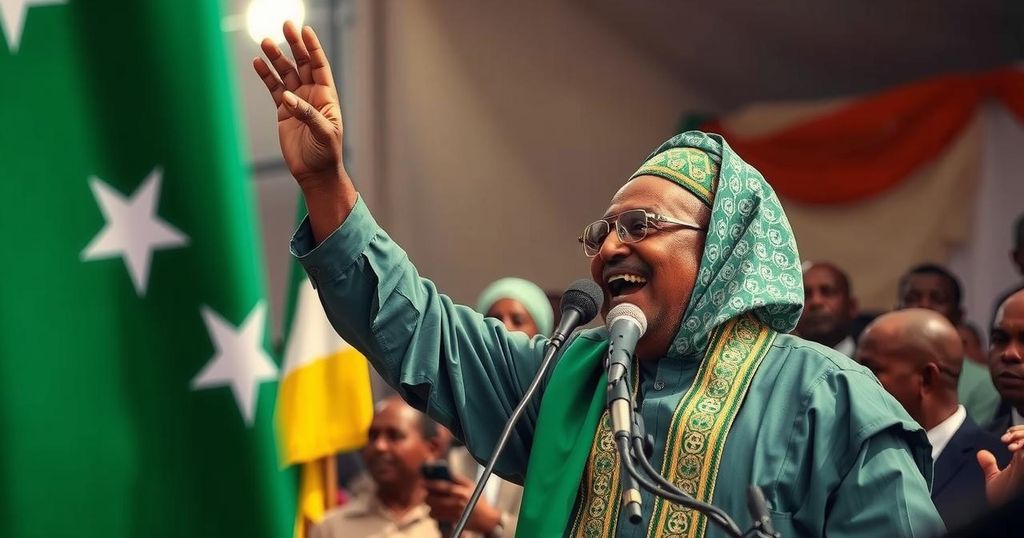Abdullahi Claims Victory in Somaliland Presidential Election, Promises Change
Abdirahman Mohamed Abdullahi, known as Irro, has won the presidential election in Somaliland, securing 64 percent of the votes and defeating incumbent President Muse Bihi Abdi. This election comes after a two-year delay and highlights Somaliland’s continued efforts to gain international recognition while improving its economy. Despite its self-governance since declaring independence in 1991, Somaliland lacks formal recognition, limiting its international interactions and support.
Abdirahman Mohamed Abdullahi, known as Irro, has emerged victorious in the presidential elections held in Somaliland, a self-declared republic in the Horn of Africa that has not received international recognition. Leading the opposition Waddani Party, Abdullahi secured approximately 64 percent of the votes against the incumbent President Muse Bihi Abdi from the Kulmiye Party, who received around 35 percent. This election marks a significant political shift after a two-year delay due to funding issues and underscores the region’s continued quest for international legitimacy and economic rejuvenation. Both leaders notably focused on reviving an economy that has faced various challenges while also promoting Somaliland’s ambitions to gain formal recognition on the global stage. Somaliland, having unilaterally declared independence from Somalia in 1991 amidst a period of conflict, has fostered a stable governance structure, contrasting starkly with the ongoing security struggles within Somalia. The region operates its own government, currency, and security forces. Despite these advancements, the absence of international recognition severely limits Somaliland’s access to financial resources and the mobility of its six million populace. Furthermore, the Somaliland government is optimistic about potential recognition from international powers, particularly amidst shifting political attitudes in the United States, which could favor Somaliland during the upcoming Trump administration. A possible agreement with Ethiopia to provide the landlocked nation access to the sea has also created tensions, as it could further strain relations between Somaliland and the federal government in Mogadishu, which perceives such moves as infringements on its sovereignty. The ramifications of this political transition, along with the international community’s response to Somaliland’s longstanding aspirations, will likely significantly influence the region’s stability and economic prospects. The province remains hopeful that enhanced dialogue and shifts in diplomatic recognition could pave the way for a more solidified standing in the region. This recent election illustrates the ongoing dynamics in Somaliland’s pursuit of international acknowledgment, economic revitalization, and internal governance stability. The outcomes reveal the populace’s desire for change, encapsulated in the overwhelming support for Irro, which signals a mandate for the new administration to address pressing issues rooting from both economic needs and geopolitical aspirations.
Somaliland declared independence from Somalia in 1991, following years of civil unrest and conflict. Unlike Somalia, it has maintained a degree of political stability, establishing its own government and security apparatus. However, it remains unrecognized as a sovereign state by the international community, complicating its accessibility to financial institutions and the global traveling capabilities of its citizens. Tensions have risen recently over Ethiopia’s proposed involvement with Somaliland, potentially providing access to the sea in exchange for support in securing international recognition. The political landscape is evolving, especially with shifting attitudes among key players, such as the United States.
The election of Abdirahman Mohamed Abdullahi marks a pivotal moment in Somaliland’s political history, reflecting the citizens’ call for change. As he embarks on his presidency, the prevailing challenges are centered around gaining international recognition, revitalizing a struggling economy, and navigating complex diplomatic relations, particularly with neighboring Somalia and Ethiopia. The outcome may not only reshape governance in Somaliland but also influence its long-standing quest for sovereignty in the eyes of the global community.
Original Source: www.aljazeera.com




Post Comment